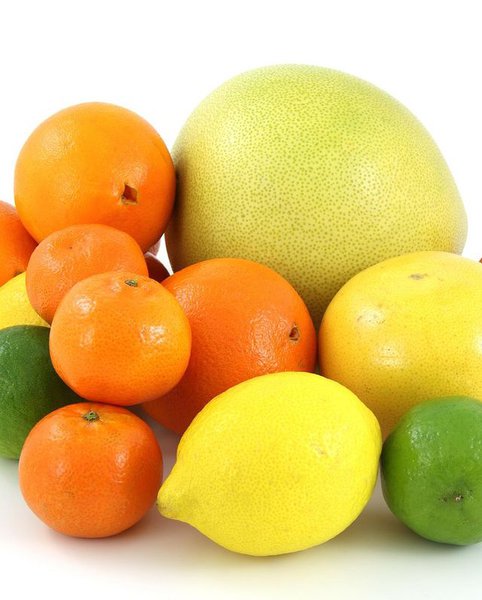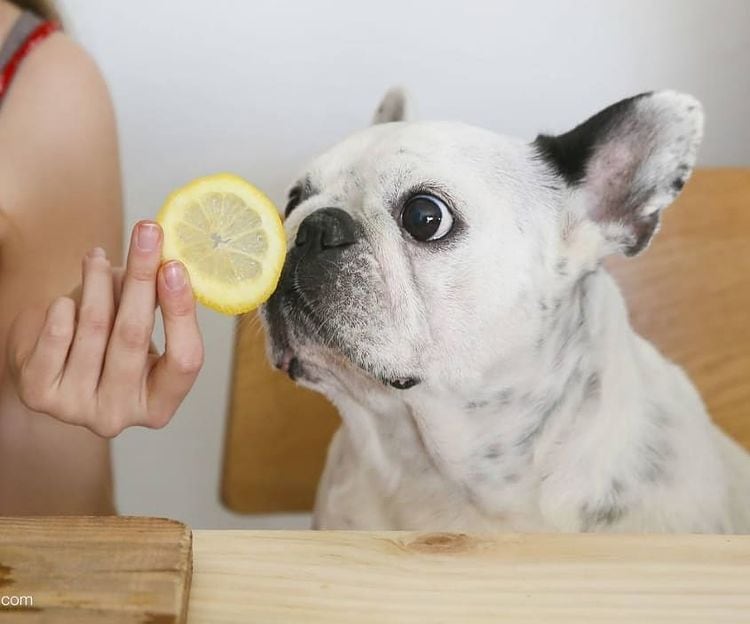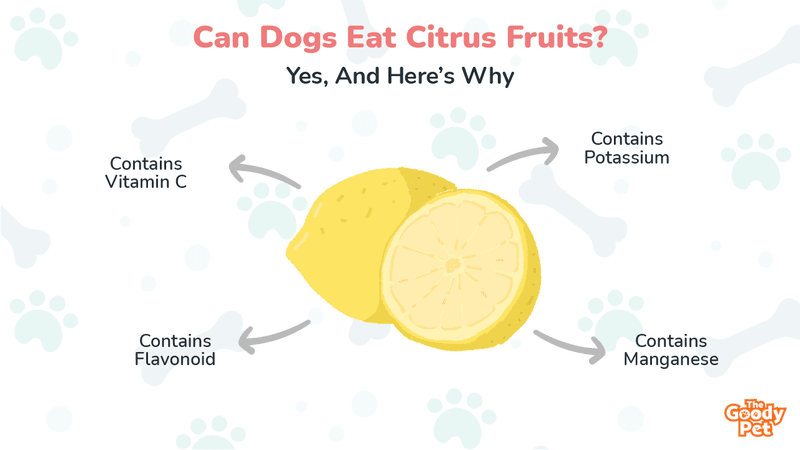Many dog owners want to reward their dogs with human food. After all, if you can eat it, it must be safe for your dog, too, right? Well, not quite. Knowing which fruits your fido can eat is crucial. So can canines eat citrus fruits?
Yes, dogs can eat citrus fruits, and they stand to benefit nutritionally from eating these fruits, such as vitamin C. The citric acid and natural sugars found in citrus fruits are not harmful to your dog unless you feed them too much.
There are many citrus fruits, and I will discuss some of them and whether they are beneficial or toxic to your pooch. Although not all citrus fruits are toxic to dogs, you just have to learn which specific ones your dog can enjoy, such as oranges. So which citrus fruit is suitable for your furry friend? Continue reading to find out.
Are Citrus OK For Dogs?

Yes, citrus fruits are okay for dogs to consume. They are naturally sweet fruits and contain certain nutrients that aid in the holistic development and wellbeing of your doggo.
Some of the highly beneficial nutrients in citrus that make them ideal for your pet are;
Vitamin C
Vitamin C is a potent antioxidant that hunts down and destroys free radicals to prevent cells from harm. It also helps the dog’s immune system by lowering inflammation, combating cancer, and slowing down cognitive aging.
Vitamin C is produced spontaneously in the livers of dogs. Reduced liver function can be seen in dogs with high levels of exercise or acute anxiety, and vitamin C supplements may help. It’s also needed for collagen formation, which aids wound healing and keeps blood vessels, tendons, ligaments, and bones in place.
Flavonoid
Citrus flavonoids are antioxidants, and they neutralize free radicals and may help to prevent heart diseases in dogs.
Citrus flavonoids have also been shown in studies to enhance blood flow through coronary arteries, limit the potential of arteries to form blood clots, and inhibit the oxidation of LDL cholesterol, which is a precursor to plaque development.
Potassium
This mineral is necessary for your dog’s kidneys to operate properly. It also promotes proper cardiac and muscle function, as well as a healthy digestive tract.
Manganese
Here is a mineral that helps to maintain the health of bones and cartilage in the joints. It also supports your pet’s energy levels by metabolizing protein and carbohydrates, which aids in the creation of fatty acids. Manganese is found in most citrus fruits.
Fiber
Fruit fiber is soluble fiber, which means that it promotes the formation of beneficial gut flora and healthy cells in your dog’s colon. The fiber helps with stool consistency and regularity by absorbing water. Fiber also aids transit time or the amount of time it takes for food to pass through the digestive system.
Can Citrus Hurt Your Dog?

Citrus fruits can cause much stomach discomforts in dogs when taken in high amounts. They have the potential to cause coma, seizures, and even death. As a result, you should avoid giving citrus fruits to your canine companion in large quantities.
What Substances In Citrus Can Hurt Your Dog?
Although citrus fruits contain beneficial nutrients that can help your pooch, some citrus fruits contain certain substances that may be dangerous to your canine companion. We discuss these substances in the following lines.
Linalool
Linalool is a chemical substance that adds a flowery note to the citrus aroma and is commonly used as an insecticide in lotions and soaps as a fragrance.
Psoralen
It’s a chemical present in various plants, including citrus fruits like lemons and limes, used to treat skin problems but can potentially cause phototoxicity in dogs.
Imazalil
Imazalil can cause cancer and damage to the reproductive and endocrine systems. Clementines, grapefruits, and oranges were found to have the highest concentrations of this fungicide. It has been classified as a probable carcinogen by the EPA. In animal studies, it has also been shown to alter hormone levels.
Which Citrus Fruits Contain These Substances In Dangerous Proportions?
When it comes to citrus acidity, lemons and limes come out on top. Vitamin C (ascorbic acid) can account for up to 32% of the weight of some fruits.
Lemons can have up to 187% of the daily vitamin C intake recommended for dogs. Citric acid accounts for 5% to 6% of the fruit’s content. On the other hand, limes have a pantothenic acid content of about 3%. The vitamin C content of a fresh lime juice is 121% of the daily value for pooches, and the pantothenic acid content is 1%.
How Much Citrus Can A Dog Eat?
Depending on their size, you can give your dog one or two slices (smaller breeds) or a full tiny orange (big dogs). Despite their nutritional content and deliciousness, your pooch should not consume oranges regularly but rather as a delicacy for special occasions.
If you notice any weird behavior in your four-legged furry friend, stop giving it citrus fruits immediately. Even if your dog enjoys them and exhibits no evidence of ill effects, keep its daily calorie intake of oranges and treats to no more than 10% of its total. Keeping its treat intake to a minimum is important to prevent obesity and other issues.
What Happens If Your Dog Takes Poisonous Citrus?
Your doggo can get a quick reaction to poisonous citrus fruit, while some might take time before they react.
Here are some of the harmful effects of citrus on your loyal companion;
Obesity
Lemons, grapefruits, and limes contain citric acid and a high sugar level, both of which might contribute to obesity. You should ensure that your dog only eats orange fruit and not peels. Hence, you should avoid feeding your dog lemons, grapefruits, and limes. While you can give your pooch an orange, you should do this in moderation.
Pain
Although a small amount of citrus fruit is unlikely to cause any harm, larger amounts can upset your doggo’s stomach. Larger amounts of these fruits, or the trees on which they grow, can cause acute discomfort. However, this is uncommon because dogs dislike many of these fruits.
Diarrhea
Diarrhea can strike your dog at any time after taking contaminated citrus fruits. While diarrhea in canines is unsightly and annoying for their owners, it can also signify a more serious health issue. If your doggo is experiencing diarrhea, you should consult your veterinarian.

Drooling
An increase in salivation or a change in the nature of the saliva can often indicate an adverse reaction to citrus fruit. Because some dog breeds drool more than others, recognizing excessive salivation will require you to know what is normal for your dog. If you notice any unusual sign or reaction in your dog after taking a citrus fruit, seek treatment.
Lethargy
Lethargy is a general weakness or exhaustion that might arise in your pooch. It could be a temporary issue or one of the earliest indicators of a more serious ailment like hypoglycemia, cancer, or diabetes. Consult your veterinarian if your dog has been lying around, refusing to play, and is generally miserable for more than 24 hours after taking a citrus fruit.
Internal Bleeding
This is one of the adverse effects of citrus fruits on your pooch. The great news is that it rarely happens. Pale gums, a racing heart, coughing up or vomiting blood, weakness or lethargy, or a dog falling over or collapsing are all signs of internal bleeding.
How Can You Treat Poisonous Citrus Reaction?
Start by giving your pooch first aid. However, you should take your dog to the vet if it shows no improvement within the next hour or two.
Administer First Aid Treatment
If your doggie’s skin has been exposed to toxins, you may need to wash it with soap and water (keeping it away from their eyes, ears, mouth, and nose). Limonene and linalool are fragrances in many shampoos. Therefore, you should avoid using dog shampoo when eliminating citrus oil.
Have a 3% hydrogen peroxide solution on hand in case of an emergency. Anything your dog has vomited or chewed should be collected, sealed in a plastic bag, and brought to the veterinarian’s office.

Take Your Dog To The Vet
Vets don’t usually induce dogs to vomit because they may inhale harmful oil into their lungs while doing so. This can cause further health complications. However, your vet can use gastric irrigation to physically remove as much of the toxin as possible from your pet’s digestive tract.
The vet will also give your loyal friend activated charcoal to prevent additional absorption of the harmful chemical into your dog’s bloodstream. Further treatment may include the administration of IV fluids, and if they suspect the kidneys and liver have been harmed, the doctor may request blood tests.
Depending on the symptoms, the veterinarian may utilize alternative medications. Pain relievers, anti-ulcer medications, and antibiotics are examples of such medications. The veterinarian will also prescribe drugs to protect the liver, kidneys, and stomach.





